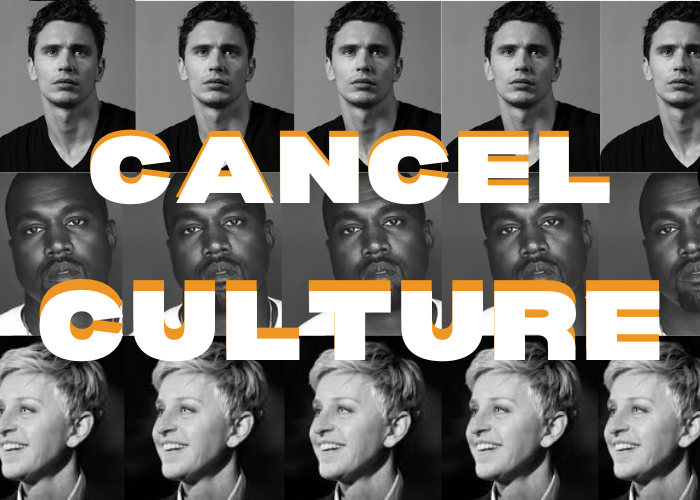
By Lauren Hyland
In the realm of entertainment and creativity, the question of separating art from the artist has sparked heated debates, challenging audiences to navigate the moral complexities of enjoying artistic works while condemning the actions of their creators. This dilemma has become increasingly prevalent in the era of social media and cancel culture, where artists’ personal lives and behaviors are scrutinized under a microscope.
One such example is the controversy surrounding Kanye West, whose musical genius is juxtaposed with his controversial statements and actions.
Kanye West, a prolific rapper, producer and fashion designer, has undeniably left an indelible mark on the music industry with his groundbreaking albums and innovative approach to artistry. However, his outspoken nature and polarizing behavior have often courted controversy. In recent years, West has faced criticism for making antisemitic remarks, among other offensive comments, raising questions about whether fans can ethically continue to support his work.
The moral dilemma of separating art from the artist forces individuals to grapple with conflicting emotions. On one hand, there is a desire to appreciate the artistic merit and cultural significance of a piece of music, film or literature independently of its creator. Art has the power to evoke emotions, inspire creativity and foster connections among diverse audiences, transcending the personal flaws of its maker. However, this viewpoint is challenged by the argument that consuming art produced by morally questionable individuals implicitly condones or supports their actions.
In the case of Kanye West, fans are confronted with a difficult decision. Can one reconcile admiration for his musical talent with condemnation of his offensive behavior? Is it possible to enjoy his songs while simultaneously holding him accountable for his words and actions? These questions highlight the nuanced nature of the debate and underscore the complexities of navigating moral gray areas in the realm of art and entertainment.
Today, thousands of artists remain guilty of past or present failures, including widely well-known ones.
Bo Burnham, the multi-talented comedian, musician and filmmaker, has undergone a significant evolution in his approach to comedy and storytelling throughout his career, after a retrospectively morally rocky start. Known for his witty wordplay, musical prowess and sharp social commentary, Burnham initially gained fame for his provocative humor that pushed boundaries and challenged societal norms. However, as he has matured and grown as an artist, Burnham has shifted his perspective, acknowledging and reflecting on the impact of his past jokes, particularly those that may have caused harm or offense.
In his early years as a performer, Burnham gained attention for his irreverent and often controversial comedy routines, which tackled taboo subjects with fearless audacity. His edgy humor and willingness to broach sensitive topics earned him a dedicated fan base but also garnered criticism from those who felt his jokes crossed the line into offensiveness or insensitivity. Burnham often made jokes at the expense of others, alluding to homophobic, sexist or racist comments and stereotypes unappreciated by many.
As Burnham’s career progressed, he began to reassess his approach to comedy and the implications of his material. In interviews and public statements, Burnham has expressed regret for some of his past jokes, acknowledging that they may have perpetuated harmful stereotypes or caused pain to certain individuals or communities. Rather than shying away from these criticisms, Burnham has actively engaged with them, using his platform to address the complexities of humor, empathy and responsibility.
In recent years, Burnham’s comedy has taken on a more introspective and introspective tone, as evidenced by his acclaimed Netflix specials, “Make Happy” and “Inside.” In these performances, Burnham grapples with themes of anxiety, loneliness and the human condition, blending humor with genuine vulnerability and emotional depth.
Burnham has taken accountability for his actions, apologized and made a change all while understanding those who will never forgive him. Do his apologies outdo the offensive nature of his infant routine? Or will he forever be associated and reprimanded with his material as a teenager?
Furthermore, the controversy surrounding separating art from the artist extends beyond individual preferences to broader societal implications. In an age where cancel culture reigns supreme, artists face heightened scrutiny and accountability for their conduct both on and off the stage. While holding individuals accountable for harmful behavior is essential for fostering a culture of accountability and respect, it also raises questions about forgiveness, redemption and the potential for personal growth and change.
Ultimately, the debate over separating art from the artist is a deeply personal one, shaped by individual values, beliefs and experiences. While some may choose to boycott the work of artists whose actions they find unforgivable, others may opt to engage critically with their art while condemning their behavior. Regardless of where one falls on the spectrum, it is essential to approach these discussions with understanding and a commitment to the betterment of media as a whole.





